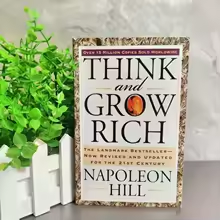
Think and Grow Rich: lessons every man needs today

Discover the timeless lessons from Napoleon Hill’s Think and Grow Rich. A breakdown with modern examples for success in life and business.
Few books have shaped men’s success like Napoleon Hill’s Think and Grow Rich. Published in 1937, it’s sold over 100 million copies and influenced leaders from Andrew Carnegie to modern entrepreneurs. But most men today haven’t read it, or worse, they read it once, nodded, and did nothing with it.
This isn’t just a book about making money. It’s about mastering your mind, sharpening your decisions, and building a life worth living. In this guide, we’ll walk through each chapter of Think and Grow Rich, break down its core lesson, and show you how to apply it in today’s world.
Let’s get into it.
Desire: the starting point of all achievement
Hill begins with desire. Not casual interest, but a burning obsession. Every empire, every great achievement, started with a man who refused to settle for average.
Lesson: Define exactly what you want, when you’ll have it, and what you’ll give in return.
Modern example: Jeff Bezos didn’t just “want to sell books.” He had a specific desire: to create the world’s largest online bookstore within a set timeline. That desire became Amazon.
Application: Write down your top goal. Example: “I will earn $250,000 annually from my business by December 2026. I’ll achieve this by mastering online sales and providing unmatched value.” Read it daily until it burns into your subconscious.
Faith: belief is the fuel
Hill teaches that faith is created by repeated affirmation and visualization. Your subconscious believes what you feed it.
Lesson: If you don’t believe you can win, you’ve already lost.
Modern example: Muhammad Ali didn’t just box, he declared “I am the greatest” until the world believed it too. That wasn’t arrogance; it was programmed faith.
Application: Stand in front of a mirror daily and state your goals in the present tense: “I am building a thriving business. I am a leader in my field.” Do this until it feels real.
Autosuggestion: reprogram your mind
Autosuggestion is feeding your subconscious with intentional thoughts. Left unchecked, it absorbs fear and negativity.
Lesson: Control the mental conversation, or it controls you.
Modern example: Athletes visualize making the perfect shot long before they hit the court. Michael Phelps visualized every stroke of a race before diving into the pool.
Application: Record your goals in your own voice and play them every morning. Turn commutes into brain training instead of noise.
Specialized knowledge: focus beats general learning
General knowledge makes you smart. Specialized knowledge makes you rich.
Lesson: Stop being a know-it-all. Be a know-it-deep.
Modern example: Elon Musk mastered rocket engineering well enough to build SpaceX, despite not starting as a scientist. He sought specialized knowledge, not general trivia.
Application: Instead of trying to read 50 books on random topics, master one skill deeply, sales, coding, investing, storytelling, and use it relentlessly.
Imagination: ideas are currency
Hill distinguishes between synthetic imagination (remixing existing ideas) and creative imagination (new, original insights). Both matter.
Lesson: Every fortune starts with an idea.
Modern example: Airbnb wasn’t new. Hotels already existed. The founders simply used synthetic imagination: renting air mattresses in a small apartment and scaling the concept globally.
Application: Set aside 20 minutes a day to brainstorm 10 new ideas. They won’t all be gold, but one could change your life.
Organized planning: execution wins
A goal without a plan is just a fantasy. Hill reminds us that even the best plans need to be tested, adjusted, and improved.
Lesson: Execution beats daydreaming.
Modern example: Steve Jobs didn’t just dream of the iPhone. He built prototypes, tested them, refined them, and launched when it worked.
Application: Write down a 90-day plan. Break your big goal into weekly actions. Review and adjust every Sunday.
Decision: stop hesitating
Indecision is the enemy of progress. Hill found that leaders decide quickly and rarely change their minds.
Lesson: Slow decision-making kills momentum.
Modern example: Warren Buffett made a decision in minutes to buy companies like GEICO because his preparation allowed him to act fast when opportunities appeared.
Application: Next time you face a decision, give yourself a deadline. Big or small, decide within 24 hours and commit.
Persistence: the will to keep going
Most men quit at the first sign of resistance. Persistence separates the dreamers from the doers.
Lesson: Persistence, backed by desire, guarantees results.
Modern example: J.K. Rowling was rejected by 12 publishers before Harry Potter was accepted. Her persistence created a billion-dollar franchise.
Application: When you hit resistance, ask: “What would persistence look like right now?” Then do it.
The master mind: your network is leverage
Hill emphasizes the power of aligning with others. The right group multiplies your growth.
Lesson: Lone wolves starve. Teams conquer.
Modern example: Bill Gates built Microsoft with Paul Allen, and later surrounded himself with sharp minds. No empire is solo.
Application: Build a mastermind group of 3–5 men. Meet weekly, share goals, hold each other accountable.
The mystery of sex transmutation
This chapter is infamous. Hill suggests sexual energy can be redirected into ambition and creativity.
Lesson: Raw sexual drive is power, if you harness it.
Modern example: History’s most creative men: Tesla, Da Vinci, Freud, were known for redirecting sexual energy into art, science, or invention.
Application: When you feel strong sexual energy, instead of wasting it, channel it into building, creating, or training.
The subconscious mind: the control center
The subconscious doesn’t judge; it accepts whatever you feed it.
Lesson: Fear or faith, your subconscious runs on what you supply.
Modern example: Athletes use mantras like “I’m unbreakable” to reprogram confidence. Soldiers train under stress so their subconscious responds automatically in battle.
Application: Write down the negative phrases you repeat (“I can’t,” “I’m not ready”). Replace them with affirmations and rehearse daily.
The brain: broadcasting and receiving station
Hill saw the brain as a transmitter and receiver of thought.
Lesson: Your thoughts aren’t private, they attract similar energy.
Modern example: Ever notice how negativity spreads in a group? Or how being around ambitious men pulls you higher? That’s real-world broadcasting.
Application: Audit your environment. If your circle broadcasts fear and excuses, change the channel.
The sixth sense: sharpening intuition
Hill called this the “door to the temple of wisdom.” Once you master the previous steps, intuition gets sharper.
Lesson: Intuition is real, but it only works when trained.
Modern example: Seasoned investors make “gut calls” that aren’t random, they’re based on years of pattern recognition.
Application: Journal decisions. Note when your gut was right. Over time, you’ll calibrate instinct with experience.
The six basic fears
Hill warns that fear is the greatest enemy. The six fears: poverty, criticism, ill health, loss of love, old age, and death.
Lesson: Fear paralyzes desire, decision, and action.
Modern example: Most men don’t start businesses not because they can’t, but because they fear failure and criticism.
Application: Write your top three fears. Ask, “What’s the worst that happens if this fear comes true?” You’ll realize most fears are paper tigers.
Wealth is mindset first, money second
Think and Grow Rich is more than a book, it’s a playbook for mastery. The world hasn’t changed much since 1937. Desire still fuels achievement. Faith still separates winners from losers. Fear still cripples men.
The difference is how fast the modern world rewards those who apply these principles. Information spreads instantly. Opportunities multiply. But so do distractions and excuses.
If you want to grow rich, not just in money but in strength, freedom, and legacy, start here: master your thoughts, commit to your vision, and surround yourself with men who push you higher.
Wealth isn’t luck. It’s built.




























